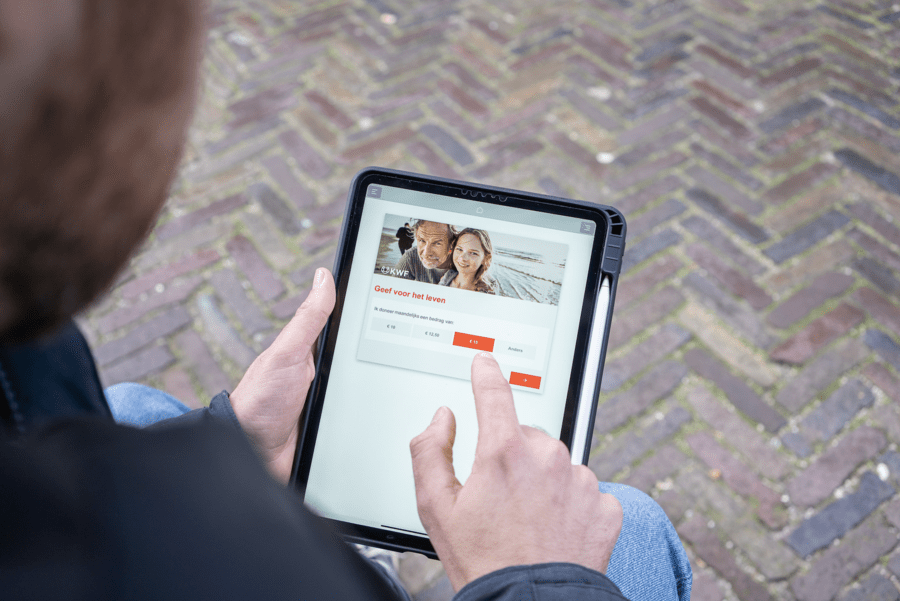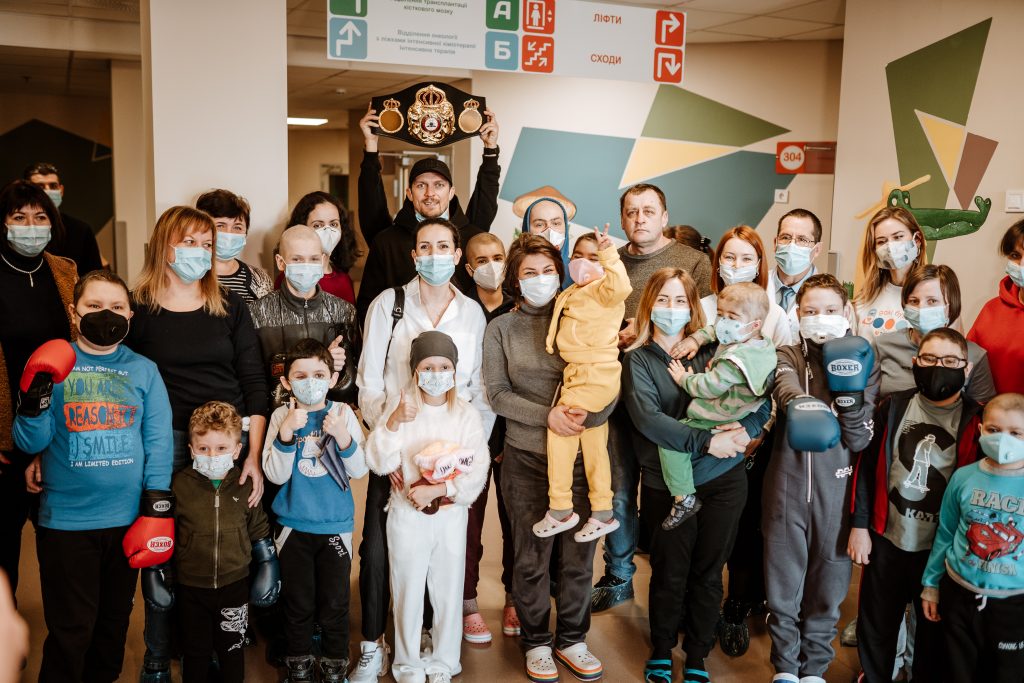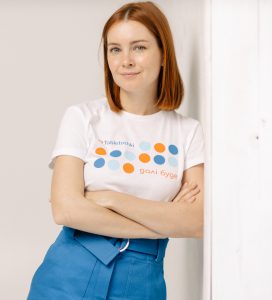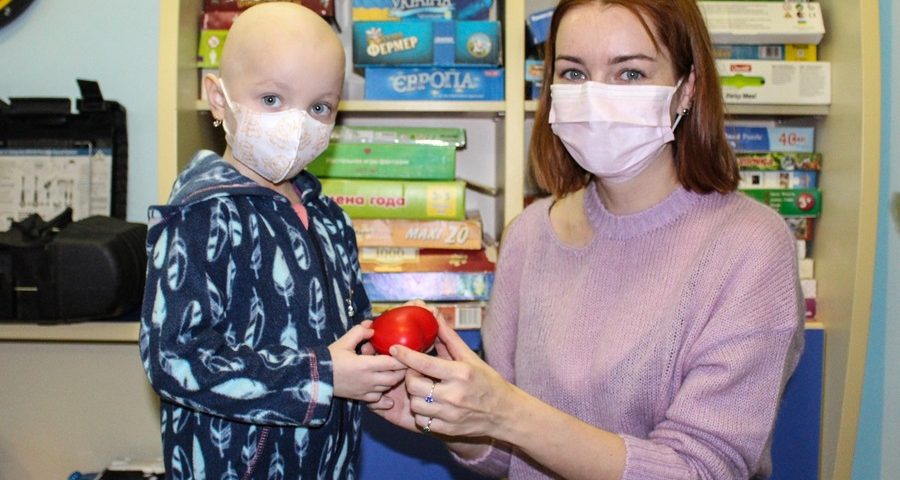
Jordan van Bergen: Charities must practice data minimisation
April 5, 2023
F2F fundraising: how technology is helping nonprofits meet changing needs
May 17, 2023What does it mean for a national nonprofit when war strikes in their country? This month, Fundraising Europe talks to Olya Kudinenko, founder of Tabletochki, the largest charity in Ukraine supporting children with cancer, to find out how the war has impacted its operations and fundraising, and how the nonprofit has responded.
Since 2011, Tabletochki has worked to transform paediatric oncology in Ukraine, improving the quality of treatment for over 60,000 children with cancer. Olya, could you tell us a little about the charity and its history?
Yes of course – but first an explanation about our name! In Ukrainian, tabletochki is a kid’s word for a pill, like saying kitty for cat, or doggy for dog. I founded Tabletochki at the end of 2011 when I was 23 and a PR manager, after I discovered that many drugs for children with cancer were not available in Ukraine, with parents often having to find them overseas and bring them into the country themselves.
Back then, we didn’t hear much about helping others through philanthropy, or about charities and foundations because of Ukraine’s Soviet heritage – in the Soviet Union there were no problems the government couldn’t solve. It was something I really wanted to help with so I decided to use my PR skills to start talking publicly about how people could help to change the lives of kids with cancer.
The first big success I had was when I asked Ukrainians traveling in Europe to donate their unused Euro cents so we could use them to buy pills that were not available in Ukraine – and that is why we called the foundation Tabletochki. In the first month, I raised $1,000 and being young and naïve, believed I had made a huge difference! I soon found out that the problem was much bigger and if I wanted to change survival rates for kids with cancer in Ukraine, I had to do more. So I left my corporate job to focus on Tabletochki Foundation: building a team, fundraising, and learning everything I could from the UK and US about childhood cancer and how foundations in these countries provide support.
So how does Tabletochki work?
Our vision is that no Ukrainian child dies from cancer so we help in four ways. First of all, we provide direct support and relief – we buy pills and pay for diagnoses, and we offer the only palliative care programme for kids with cancer in Ukraine. We also provide support after treatment, no matter how that treatment ends, which means we help families in grief, and with rehabilitation when children survive. Whatever a family needs during and after treatment, we provide it. Secondly, we work with hospitals, improving infrastructure, funding repairs, and buying medical equipment and supplies – everything that a hospital needs to provide the best possible treatment.
Thirdly, we provide an educational programme for doctors and nurses, helping them develop their skills in oncology. We translate useful resources from the UK and US into Ukrainian, offer workshops and internships, and partner with international hospitals that can also help to further their learning through internships.
Last but not least, we advocate for kids and their families. For example, intensive care units used to be closed to relatives in Ukraine, meaning children in ICU were alone at a time when they really need their families, which was incredibly traumatising for all. We ran a nine-month advocacy campaign called Open Doors to ICU, and through this we changed legislation, enabling parents and relatives to visit. More recently, and another big achievement, our foundation has just succeeded after 10 years of work and of fundraising first to pay for it ourselves, to get the government to buy an important cancer drug from the UK.
Overall, since 2011 we have raised more than €25 million and improved quality of treatment and access to treatment for more than 60,000 children with cancer and other illnesses.
That’s an amazing sum of money – how have you raised it?
Primarily through individual donors. Our strategy has been to get as many people to give a small regular donation as we can. Pre-war, 60% of our income came from individuals giving an average of €8 a month, 20% came from corporations, and 20% from major donors. We didn’t have any income from international partners, and we had never applied for grants. We have always believed that Ukraine is capable of supporting our own kids with cancer.
When Russia invaded Ukraine on 24 February 2022, it was immediately evident that urgent action was required to ensure that Tabletochki’s work could continue. Olya, please tell us what happened.
When Russia invaded Ukraine, we were deeply shocked, and our thoughts were immediately on how we were going sustain the foundation and continue supporting our kids because of course so many people in Ukraine suddenly needed support that our cause was no longer on anyone’s agenda.
One of our biggest assets has been our international partners and last year 60% of our income came from outside of the country. Mostly, the funds came from long-term partners who had never donated financially to us before. In 2018 for example, we established a partnership with St. Jude Children’s Research Hospital in the US and on the first day of the war, we set up a global initiative with them, called Safer Ukraine, to move kids with cancer out of the country. We have moved 1,200 so far, to 16 countries – 14 in Europe, along with Canada and the US so they can continue treatment.
The patient’s family or clinician contact the Tabletochki Charity Foundation, then we obtain their medical records and send this information to SAFER Ukraine for translation. The child and their accompanying family members travel to a safe and central departure point in Ukraine where they and others meet their assigned transportation. Once across the border, they travel to a central triage centre to rest and await transfer to a clinic where they will continue treatment. At the moment, we are supporting 500 children and their families every month.

Oleksandr Usyk visits children at the OKHMATDYT, National Children’s Hospital in Ukraine. 15 February 2022.
How has the war impacted your fundraising? Have you seen donations from people in Ukraine fall as a result?
No – actually individual support has stayed at the same level because we have a really deep connection with our donors, and take care to engage with them all the time with personalised messages. However, we lost all of our income from our major donors and corporate donors, because their priorities have understandably changed to supporting their companies and employees, and of course the war effort.
We’ve also lost income in other ways – for instance, November was always our lowest month for fundraising so pre-war we brought Giving Tuesday to Ukraine and started to do gala events. In 2021 our Tabletochki Giving Tuesday Dinner raised almost €1 million in one evening so you can imagine how important that was for us. And secondly, we had a partnership with the biggest supermarket chain in Ukraine, supported by celebrities and on TV, where for a month they sold branded products, which also raised more than €1 million. When Russia invaded Ukraine, we knew we would not have this event or partnership in 2022, which meant a loss of around €2 million in income.
That’s a significant loss. How are you responding?
Before the war, we were the biggest foundation in Ukraine, but when Russia invaded, everything changed. This meant that we too needed to change to continue meeting our responsibilities and start asking those we had never reached out to before for support.
I established a foundation in the US which now has 501(c)(3) status, called Kids of Ukraine, to enable people and organisations in the US to give and for their donations to be tax deductible. In the past year I have raised almost €100,000 but there is still a lot of room for growth.
So we still have the foundation, which is our main foundation helping families in Ukraine, but we also now need that support from abroad.
So how do you find the support you need in the US?
First of all, I’m just reaching out to everyone I can. We received donations from family foundations and cancer-related NGOs. Maybe it’s not the right strategy, but I’m still figuring out how to do it and I have high hopes – I always have high hopes!
What are your plans then for the next year?
This is a strange thing to talk about in our current situation because of course our ambitions are no longer what they were. In 2020 for example, we decided to build the first ever children’s oncological hospital in Ukraine to try and improve the survival rate for kids with cancer. At that time it was 50% while in other developed countries it was more than 80%. So, for two years, from February 2020 through the pandemic, to the Russian invasion, that’s what we were working on – now it sounds like a fantasy movie! On 15 February last year I received the first commitment gift for €19 million out of €62 million from a Ukrainian company. Nine days later the war started and that gift is no longer available. So our overall foundation strategy right now is quite simply to provide our kids with the best treatment possible – in Ukraine, or abroad.
This might not sound ambitious, but for us right now, it’s actually really ambitious because of all the challenges Ukrainians are facing – I’m talking about blackouts, about lack of drugs, disrupted logistics, and everything else that comes with this war.
In terms of fundraising, to sustain our work today we need €330,000 per month. How this will evolve and change we will see, because the demography and territories of Ukraine have changed and it’s impossible to tell what the situation might be in a year. At home, our kids are now mostly concentrated in two hospitals, in Lviv and Kyiv, instead of in 20 across Ukraine because it’s easier to focus our resources this way. But this brings other challenges – for example, we have to rent more apartments in Kyiv for families so they can live near the hospital. We have always had a housing programme for families coming from different cities, but rented a maximum of 10 apartments. Right now we’re renting 20 and we’re still looking for more.
I really love this quotation by Churchill – if you’re going through the hell, keep going. Our goal for this year is just to keep going.
 About Olya Kudinenko
About Olya Kudinenko
Olya is the founder of Tabletochki, Ukraine’s largest charity supporting children with cancer, and of Kids of Ukraine. Since 2011, Tabletochki has transformed the field of pediatric oncology in Ukraine, improving the quality of treatment for over 60,000 children with cancer. A board member of the Ukrainian Children’s Hospital, OKHMATDYT, Olya currently manages Kids of Ukraine from New York as she raises funds for the situation children are facing in Ukraine.
A graduate of the Fortune-U.S. Department of State Global Women’s Mentoring Partnership, Olya received the C4F-Davos “Relations of the Future Award.” Olya represented Ukraine at the World Economic Forum Annual Meeting in Davos in 2019, and was named in Forbes’ 30 Under 30 Ukraine, NV Magazine’s 100 Most Influential People in Ukraine and Focus Magazine’s 100 Most Powerful Women in Ukraine.




